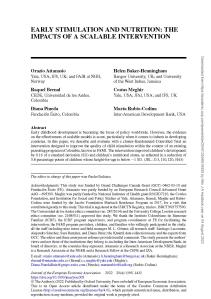Journal article
In low- and middle-income countries (LIMCs), measuring early childhood development (ECD) with standard tests in large scale surveys and evaluations of interventions is difficult and expensive. Multi-dimensional screeners and single-domain tests (‘short tests’) are frequently used as alternatives. However, their validity in these circumstances is unknown. We examined the feasibility, reliability, and concurrent validity of three multi-dimensional screeners (Ages and Stages Questionnaires (ASQ-3), Denver Developmental Screening Test (Denver-II), Battelle Developmental Inventory screener (BDI-2)) and two single-domain tests (MacArthur-Bates Short-Forms (SFI and SFII), WHO Motor Milestones (WHO-Motor)) in 1,311 children 6–42 months in Bogota, Colombia.







































